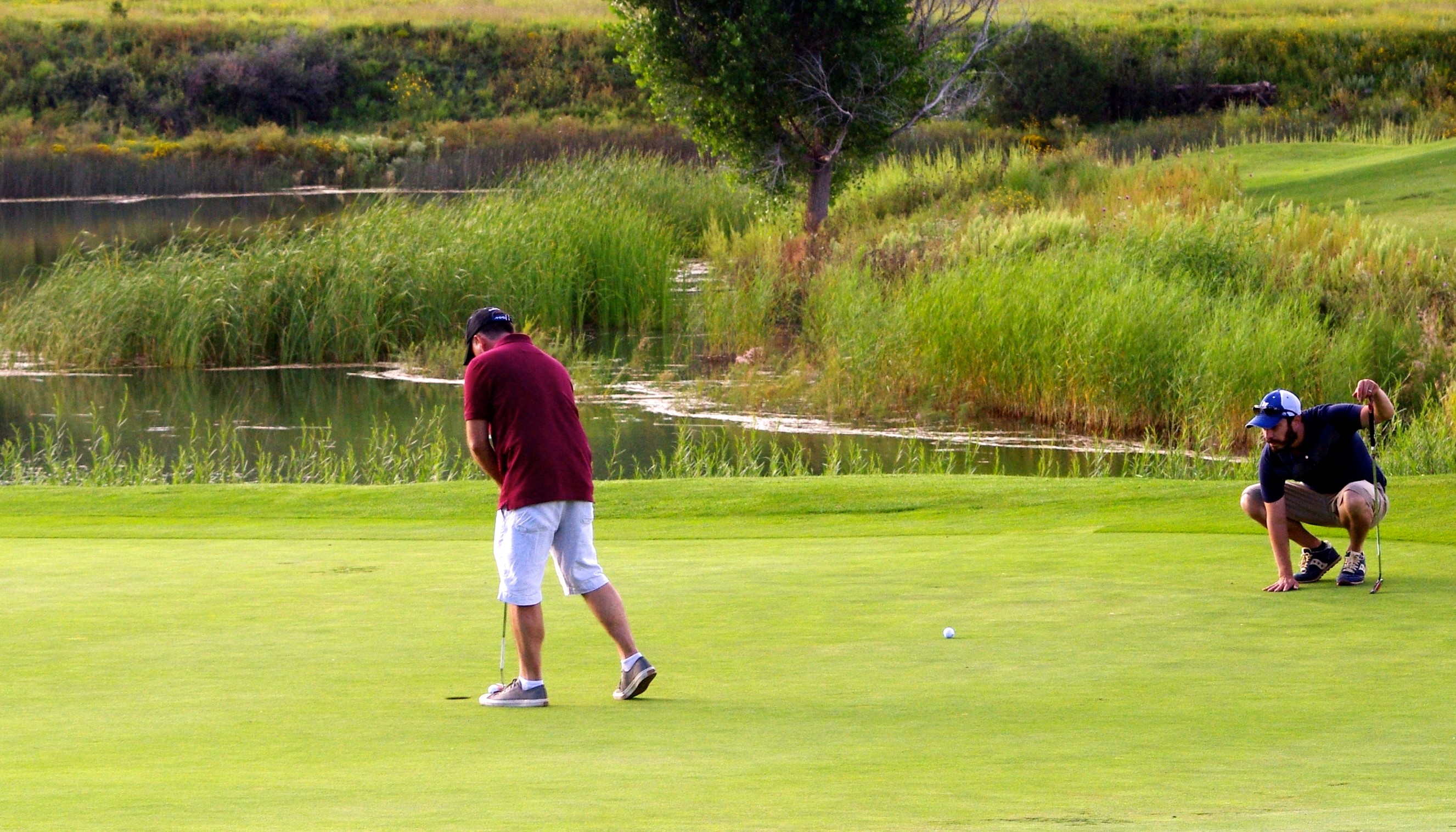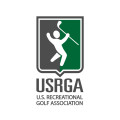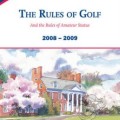
Believe it or not, the USGA doesn’t govern all of golf. And it certainly doesn’t preside over recreational golfers like you and I. The USGA, along with its rulebook, does have a place in golf. But the idea it’s the supreme ruler of all things golf is a rather widespread misconception (this goes for the R&A as well). That being said, I outline below why most recreational golfers should cast-aside the USGA rules in favor of something written more for, well…recreational golfers.
1) The USGA rules weren’t really written for recreational golfers
Let me begin by stating in no way, shape or form am I advocating we throw-out the USGA rulebook. Those rules are absolutely necessary to achieve the USGA’s founding mission: To determine the best golfers in the world. This history is clearly recounted on their website:
“1894 – In September, William G. Lawrence wins a ‘national amateur championship’ at Newport (R.I.) Golf Club. In October, Laurence B. Stoddard wins a ‘national amateur championship’ at St. Andrew’s Golf Club. C.B. Macdonald, runner-up in both events, calls for the formation of a governing body to run a universally recognized national championship.” – USGA.org
Today, the USGA is basically still doing the same thing for the top amateurs. In addition, the PGA has adopted the USGA rulebook too. This all makes sense for determining the best golfers in the world.
But what about the rest of us? All golfers – from the youngest to the oldest; the worst to the greatest; are forced encouraged to play by the USGA rules. This notion is foreign to many of the other major sports that also have youth and recreational participation. Think about your son or daughter’s little league; or your work softball team – do those strictly adhere to the rules of Major League Baseball? Of course not – the rules have been modified and/or made simpler to encourage new players and promote fun.
So that begs the question: Why isn’t there a separate set of rules for recreational golfers? For all that the USGA rules have done for the elite players in the game, the reality is the complexity of those same rules have hindered golf’s growth over the years – in particular with regards to recreational golfers (the vast majority of the game’s participants).
It should also be pointed out that while the USGA has been around for over 120 years, the game of golf was around for about 5 centuries before that. Makes you wonder how all those recreational golfers ever got by without the USGA rulebook.
2) Alleviate slow play
It’s no secret slow play is rampant in golf – from the pro tours all the way to your local muni. It’s perhaps the biggest complaint amongst average golfers and the current rulebook is (at least) partially to blame for this. A set of simpler rules for recreational players would go a long way in unclogging the links.
Why does there have to be out-of-bounds? If your ball goes into the woods, drop one near where it went in, take a stroke and move on. Why do we have to go through the entire “tend the flag” ritual? Leave the flag where it is and if the ball hits it, it counts as in. Why do we have to wait for the person furthest from the hole to play first? Instead, we should all be playing ready-golf.
I understand some folks are sticklers for this stuff, but these are the golfers a separate rulebook would help the most! A simpler rulebook would remove the hesitation some golfers have in bending the USGA rules in the first place, thus resulting in a speedier round for everyone.
3) Attract new players; and help keep the ones already playing
Try telling a newbie golfer about grounding his club in a hazard. Or that she has to walk back to the tee and re-hit if she loses her drive. How about that he or she can’t touch their ball until they are on the green. And if their ball lands in a divot in the fairway…oh well, sucks to be them. And the truth is, non of the aforementioned rules sound any better to veteran golfers either.
Watching golf on TV already has issues attracting potential players, but then the few that actually do want to try the game are met with this beast of a rulebook? It’s just not right. We should be doing everything possible to woo new folks to the game. And, part of that should be a simple set of rules that encourages fun out on the course.
Adding a rulebook specifically for recreational golfers won’t solve all of golf’s problems, but it will certainly help – especially in the longterm. And it won’t take much to implement either – there are already organizations out there like the U.S. Recreational Golf Association (more on them in a future post) who are trying to accommodate recreational golfers (including those golfers who keep a handicap) – whereas accommodating recreational golfers clearly isn’t the USGA’s priority.




I don’t know any recreational golfers who play strictly by the rules. Why do they need their own rule book when they’re not playing by the real one, anyway? If they had a book, at all, it would be called the “Make ‘Em Up As We Go Along Rules”. Three-foot gimmies, one Mulligan per nine, roll it over in the rough. I see these all the time. I really don’t think a strict adherence to the USGA rules is what’s keeping people from the game – or driving them away. And for the record, I play it down and haven’t taken a Mulligan in 20 years.
You’re right, John. Many recreational golfers do indeed bend the rules and/or come up with their own rules. But these practices need to be sanctioned as “legal” so we can officially demonstrate that the game caters to all golfers – especially new ones. I think you’d be surprised what an officially sanctioned set of recreational golf rules would do for the game.
John – lots of people say recreational golfers don’t need a separate set of rules because they are “just making up the rules anyway”. Nothing could be further from the truth. Recreational golfers often compete in some way (usually in a handicapped competition among friends) and they attempt to make up their set of rules because 1) the USGA rules are too complicated, penalizing and not accommodating of any changes, 2) the USGA refuses to bifurcate the USGA’s rules to try to accommodate rec golfers, and 3) they want to play by a set of rules, but an appropriate set does not exist (until the USRGA.org) came along.
A more relaxed but rigorous set of rules would be perfect for beginner golfers, First Tee program, Get Golf Ready program, etc. The USRGA Rules are a perfect match for these occasions AND the USRGA has a handicap system that serves the needs of recreational golfers.
Golf is a very intimidating game for the beginner – a more relaxed set of rules would help golfers better enjoy the game from the start. This would be good for golf.
The USRGA’s mission is to serve the recreational golfer. We are listening to our constituents and they have very clearly asked for 1) a set of rules appropriate for recreational golf and 2) a handicap system to go along with the Rec Rules.
Dave Felker,
USGA member and Founder of USRGA.org
I would love to have a rules book for recreational golfers. Thanks. I love golf but I’m 86 years old and recreationally shoot my age but for USGA rules for me is impossible. Is there anyway I might get a copy by e-mail or some other means? Raycine1937@gmail.com
I am a competitive player, but I am a very fast player too. I always follow the rules when in any competition.
However, when I am out on a Sunday, knocking it around with three 20 handicappers drinking a few beers and chomping on a cigar, we make it fun. Land in a divot in the fairway, move it to some grass, Hit it OB and forget to take a Provisional.. stroke and distance, end up in some inconsiderate person’s footprint in a sand trap… smooth it out. putting for an 8… that’s good. Can’t find your ball in the rough… just drop one near where everyone saw it go. Anything within 2 feet is good… but if you are in a bush or under a tree, you have to play those… too much comedic value not to… These guys STILL shoot over 100… But… we finish in 4 hours. If they were playing according to Hoyle… I’d probably still be out on the course.
I agree completely! If we high handicappers had to follow every rule by the letter they would throw us off some courses for slow play. If you make the game so difficult to beginners, they will not enjoy it.
Our Friday League tries to slplit the difference — and remain “mostly-legal” — through some generous and common-sense Local Rules for league-play. Some are to speed play along like “max. score on a hole is a triple-bogey”, and “OB is played as a lateral hazard”. Several compensate for the middling-to-poor through-the-green conditioning of our home course, “play the ball down with 6-inches on the fairways, no closer to the hole”, and “any drainage feature or swale is ground under repair”. The lakes and obvious streams remain water hazards or lateral hazards with a 6-ft buffer, since no hazard boundaries are marked or painted at our course.
Due to the hot dry Spring and Summer, the grass has been dying everywhere leaving bare earth in huge patches both in the fairways and in the rough. For the annual league tournament at the end of September, we’ll probably declare bare-spots without grass larger than 8-inches through the green — too-far to “play the ball -down’ on grass — as ground-under-repair. With bare hard-sunbaked clay and no top-soil, trying to pick a ball off bare dirt is getting dangerous. Even when we’ve had good rainy weather, the ground typically too-hard to take anything more than a very-shallow divot at the best of times.
The course only has rudimentary irrigation for the greens, and the tee-boxes are so hard right now that you can barely push a tee-in with your full-weight behind it. Some of our members carry carpenter’s awls in the bags to make a hole for the tee in the tee-box. The fairways are even harder right now since there’s been barely any rain all Summer. Last week some of the sand hazards were so rock-hard that a heavy-set man in golf shoes could walk across one without leaving any tracks — very “Shaolin Master not leaving any footprints on rice-paper”.
As a disabled golfer (I play seated from a special cart) my friends encouraged me to “bend” the rules to make the game more enjoyable for all of us. I can “bump” the ball any where off the green (this avoids extra time needed to adjust the position of my cart once or twice for every shot). Thier take on all this is since I can not hit near as far as any of my playing partners it helps even out our games and makes a sub 4 hour round commonplace for us (if we are not held up by the slow play crowd). We also play ready golf including the tee box. Golf for me ( and should be for all amateurs) is about having fun with old and new friends.
Disclaimer: Spam free, Informational intent only
HYBRID GOLF now played by thousands of golfers on hundreds of courses.
In Hybrid Golf, golfers use new Hybrid Hy-performance golf ball & play “relaxed rules”, simplified to make the game quicker.
Examples:
Three-over-par, pick it up, record score
If ball lands in fairway divot, can be moved length of PW, no closer to hole
If ball lands in.rough, must be played from rough, can be moved length of PW, no closer to hole.
If ball hit out of bounds, take penalty stroke and drop ball inline with where ball went out of bounds.
Etc.
Since Hybrid golfers play a quick 2 to 3 hour full-par & play condensed version of the game on shorter courses, this helps to significantly reduce the playing time on each hole.
Example:
Standard Course Play (on full-sized course) using standard golf ball takes (avg.)
– 41/2 to 5 Hrs. @ 15 min. (avg.) per hole
this is equal to =’s
Hybrid Course Play (on 60% Hybrid course) using (60%) Hybrid golf ball takes (avg.)
– 2 to 3 Hrs @ 8.5 min. (avg.) per hole
It should be noted that golfers continue to leave the standard game in record numbers due to time, cost & difficulty issues. That’s 12,000,000+ golfers gone in last decade.
Current statistics show 90% of traditional golfers seldom break 90.
Current statistics also show 80% of Hybrid golfers regularly break 90.
Now who do you think has more satisfaction & fun in their experience?
I think it all comes down to when , where and with whom you are playing. There’s nothing wrong with keeping the light and fun every ones and a while.